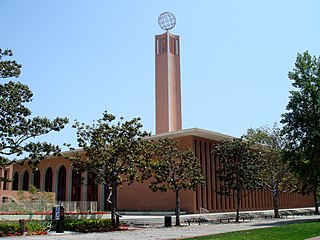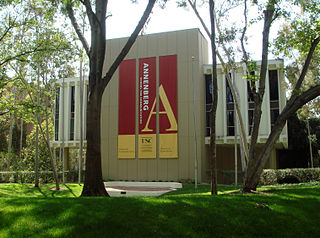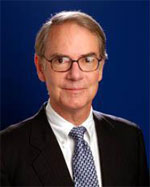In international relations, public diplomacy broadly speaking, is any of the various government-sponsored efforts aimed at communicating directly with foreign publics to establish a dialogue designed to inform and influence with the aim of building support for the state's strategic objectives. These also include propaganda. As the international order has changed over the twentieth century, so has the practice of public diplomacy. Its practitioners use a variety of instruments and methods ranging from personal contact and media interviews to the Internet and educational exchanges.

The School of International Service (SIS) is American University's school of advanced international study, covering areas such as international politics, international communication, international development, international economics, peace and conflict resolution, international law and human rights, global environmental politics, and U.S. foreign policy.
The USC Center on Public Diplomacy (CPD) was established in 2003 as a partnership between the USC Annenberg School for Communication and Journalism and the USC Dornsife College of Letters, Arts and Sciences' School of International Relations at the University of Southern California. It is a research, analysis and professional education organization dedicated to furthering the study and practice of global public engagement and cultural relations.

George Gerbner was a professor of communication and the founder of cultivation theory. He taught at Temple University, Villanova University, and the University of Pennsylvania.

The University of Southern California School of International Relations (SIR) is the third-oldest school of international relations in the world. A subdivision within the USC Dana and David Dornsife College of Letters, Arts, and Sciences, the school is known for teaching, and hiring faculty who concentrate in a variety of worldviews.

The USC Annenberg School for Communication and Journalism comprises a School of Communication and a School of Journalism at the University of Southern California (USC). Starting July 2017, the school's Dean is Willow Bay, succeeding Ernest J. Wilson III. The graduate program in Communication is consistently ranked first according to the QS World University Rankings.

The Annenberg School for Communication is the communication school at the University of Pennsylvania. The school was established in 1958 by Wharton School alum Walter Annenberg as the Annenberg School of Communications. The name was changed to its current title in 1990.
Nicholas J. Cull is a historian and professor in the Master's in Public Diplomacy program at the Annenberg School for Communication and Journalism at the University of Southern California. He was the founding director of this program and ran it from 2005 to 2019.

Eli M. Noam is an American economist and professor at Columbia Business School, where he is the Paul Garrett Chair in Public Policy and Business Responsibility. He is the director of the Columbia Institute for Tele-Information (CITI). He works on the economics, management, and policy of media and the digital world, most recently on global media ownership and on next-generation “Cloud-TV”. He has written over 400 articles and has authored, edited, and co-edited over 30 books.
The Columbia Institute for Tele-Information (CITI) is one of several research centers for Columbia Business School, focusing on strategy, management, and policy issues in telecommunications, computing, and electronic mass media. It aims to address the large and dynamic telecommunications and media industry that has expanded horizontally and vertically drive by technology, entrepreneurship and policy.

Ernest James Wilson III is an American scholar. Wilson was the Walter Annenberg Chair in Communication, and Dean of the Annenberg School for Communication at the University of Southern California (USC), Los Angeles, California from 2007 to 2017. He stepped down as dean in June 2017 and was succeeded by Willow Bay. Dr. Wilson is the founder of USC Annenberg's Center for Third Space Thinking, which is devoted to research, teaching and executive education on soft skills in the digital age. Through the center, Dr. Wilson's most recent research focuses on critical workforce competencies and talent and skills development in the 21st Century. As a fellow at the Center for Advanced Study in the Behavioral Sciences at Stanford University, he currently is writing a book on utilizing competencies via the framework of Third Space Thinking.
Public Knowledge is an American non-profit public interest group based in Washington, D.C. Founded in 2001 by David Bollier, Gigi Sohn, and Laurie Racine, Public Knowledge is primarily involved in the fields of intellectual property law, competition and choice in the digital marketplace, and an open standards/end-to-end internet.
Monroe Edwin Price was director of the University of Pennsylvania's Center for Global Communication Studies (CGCS) at the Annenberg School for Communication at the University of Pennsylvania and director of the Stanhope Centre for Communications Policy Research in London.
Stuart N. Brotman is an American government policymaker; tenured university professor; management consultant; lawyer; author and editorial adviser; and non-profit organization executive. He has served in four Presidential Administrations on a bipartisan basis and taught students from 42 countries in six separate disciplines — Communications, Journalism, Business, Law, International Relations and Public Policy. He also has advised private and public sector clients in more than 30 countries in five continents.
The Center for Global Communication Studies (CGCS) is a research center located within the Annenberg School for Communication at the University of Pennsylvania. CGCS serves as a research hub for students and scholars worldwide studying comparative communication studies, media law, and media policy. The center also provides consulting and advisory assistance to academic centers, non-governmental organizations, regulators, lawyers, and governments throughout the world.

Geoffrey Cowan is an American lawyer, professor, author, and non-profit executive. He is currently a University Professor at the University of Southern California, where he holds the Annenberg Family Chair in Communication Leadership and directs the Annenberg School's Center on Communication Leadership & Policy. In 2010, Cowan was named president of The Annenberg Foundation Trust at Sunnylands, a position he held until July 2016. In this role, Cowan was commissioned with the task of turning the 200-acre estate of Ambassador Walter Annenberg and his wife Leonore into "a venue for important retreats for top government officials and leaders in the fields of law, education, philanthropy, the arts, culture, science and medicine." Since Sunnylands reopened in 2012, Cowan has helped to arrange a series of meetings and retreats there. In 2013–14, President Barack Obama convened bilateral meetings at Sunnylands with President Xi Jinping of China and with King Abdullah II of Jordan. In 2016, President Obama hosted the Association of Southeast Asian Nations (ASEAN) at the site, where they released the Sunnylands Declaration. Prior to his time at Sunnylands, Cowan was appointed by President Bill Clinton as Director of Voice of America.

Jerrold D. Green is the president and chief executive officer of the Pacific Council on International Policy in Los Angeles, California. He is concurrently a research professor at the University of Southern California Annenberg School for Communication and Journalism.
Michael Parks was an American journalist, editor, and educator who wrote on various political events around the world throughout his career. He served as editor of the Los Angeles Times from 1997 to 2000. He won a Pulitzer Prize for International Reporting award in 1987 for his reports about the struggle against apartheid in South Africa. He also taught at USC Annenberg School for Communication and Journalism and served several stints as its director.

Jeremy F. Curtin is a career member of the Senior Foreign Service of the United States with the rank of Career Minister. Curtin has held a number of positions in the U.S. Information Agency, the National Security Council, and the U.S. State Department. From 2007 to 2009, he served as the State Department's Coordinator for International Information Programs. He has served the United States in various diplomatic posts overseas - namely, South Korea, Finland and Poland.
Cynthia "Cinny" Clare Kennard is an American business and nonprofit executive, author and former broadcast journalist. She is the executive director of The Annenberg Foundation, based in Los Angeles, and Annenberg PetSpace.









